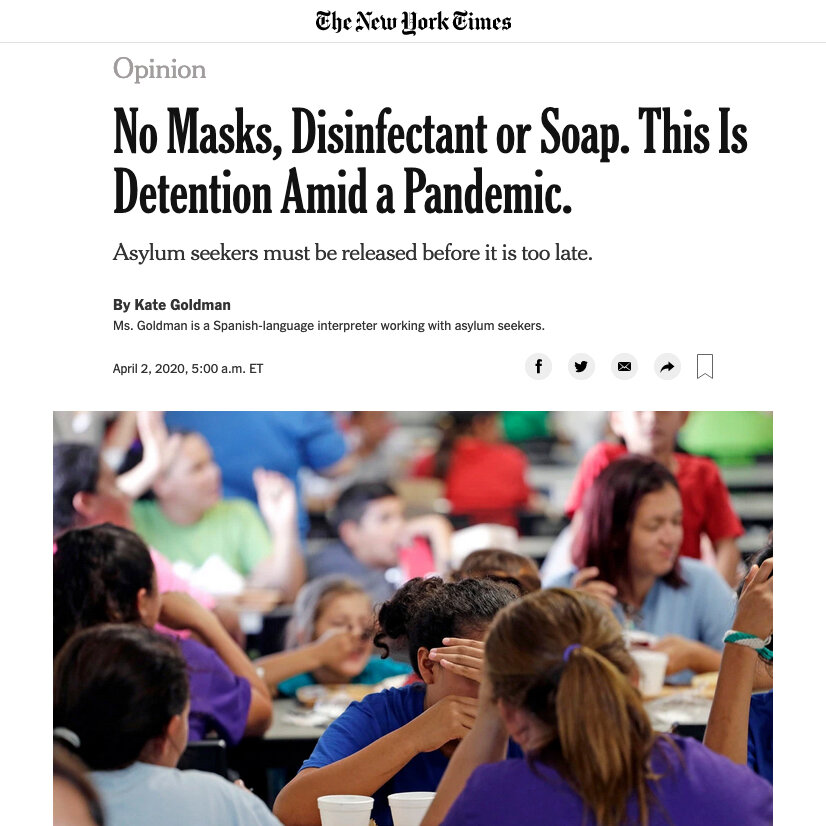Respond Blog
The urgent need for language access in Immigration Detention
Linguists with Respond Crisis Translation participated in interviewing and sharing their expertise in this research article titled “Held Incommunicado: The Failed Promise of Language Access in Immigration Detention.”
Respond's Arabic team featured in THE LINGUIST
Respond Crisis Translation Arabic team feature in THE LINGUIST.
Miranda Moore explores the work of translators both inside and outside Gaza, and the difficulties they face.
Rudaw features Repond’s project on anti-Kurdish language violence after 2023 Turkey-Syria earthquake
Rudaw, a major publication in Iraqi Kurdistan, featured Respond Crisis Translation’s Kurdish storytelling project, “One year since the quake: Linguicide and resilience of the Kurdish language.”
Even though the media extensively covered the Turkey-Syria earthquake that killed more than 59,000 people exactly one year ago ...
Respond on NPR’s KJZZ: Biden’s “impossible” rule that asylum seekers bring their own interpreters
Respond’s founder and executive director Ariel Koren joined KJZZ, the National Public Radio member station in Phoenix, Arizona, to talk about a new rule requiring asylum seekers to bring their own interpreters during USCIS interviews
Respond’s language rights interventions in Futurism and PRX Radio Station
IN CASE YOU MISSED IT: Respond Crisis Translation’s unmasking of the dangers and ills of unsupervised reliance on AI and machine translation tools in the U.S. asylum and immigration context was featured in Futurism’s The Byte and on The World from PRX’s Things That Go Boom podcast.
Respond covered in Bloomberg, Reuters, PBS, Al Jazeera, Teen Vogue: Raising awareness about language rights in 2023
While working tirelessly around the clock to provide life-saving translation and interpretation on the front lines of crises across the globe, Respond has also driven coverage on issues of language justice throughout 2023.
Respond in Bloomberg: “The Nonprofit at the Border That Translates 170 Languages”
Bloomberg Businessweek describes how Respond has become a primary lifeline for many migrants and advocates at the U.S.-Mexico border, especially as private companies contracted by the U.S. government fail to provide adequate translators and interpreters.
Respond in Al Jazeera: Intervention leads BBC News to correct egregious mistranslation
On Saturday, November 25, a clip posted by BBC News showed a released Palestinian prisoner describing horrific abuses inside an Israeli prison. She said, in Arabic, that Israel held them in the cold without electricity, "sprayed us with pepper spray" and “left us to die." …
Respond in Reuters’ Context: “AI's 'insane' translation mistakes endanger US asylum cases”
Respond tells Context about how “insane” machine translation errors are jeopardizing U.S. asylum claims. Names translated as months of the year, incorrect time frames and mixed-up pronouns – the everyday failings of AI-driven translation apps are causing havoc in the U.S. asylum system, with our human translators left to clean up the mess.
The Guardian on Respond’s language rights interventions: “Lost in AI translation”
Respond Crisis Translation shared with The Guardian about how the U.S. government’s growing reliance on unsupervised machine translation to cut costs has jeopardized several asylum applications.
Respond in Teen Vogue: The US weaponizes language against asylum seekers
Respond Crisis Translation’s Valentina Callari Lewis writes that asylum seekers who speak Indigenous and marginalized languages are regularly deprived of their fundamental human right to quality translation services at the US border.
Respond Crisis Translation in the news: Language violence is threatening asylum seekers at the border
Language violence against asylum seekers on the border is increasing. All asylum seekers are now required to use the government’s new glitchy CBP One Mobile App in order to initiate the asylum process. It is only partially accessible in 5 poorly translated languages. As our Haitian Creole Team Lead recounts in the article…
Respond Crisis Translation on PBS NewsHour: Machine translation is endangering asylum claims
Machine translation is on the rise. For-profit government contractors and aid organizations are increasingly adopting these tools to cut costs. This not only costs translators their jobs, but is quite literally jeopardizing Afghans’ asylum cases. The error-riddled translations in Dari, Pashto, and countless other languages…
AI Machine Translation Jeopardizing Afghan Asylum Claims
“Machine translations of Pashto and Dari, in particular, are riddled with errors that have introduced confusion into already complex immigration processes, and led to the rejected asylum claim of at least one Afghan refugee.”
“Haiti Then and Now's" Interview With Laura Wagner - Respond's Haitian Creole Team Co Lead
“I wanted to write a story about the earthquake that was also about ordinary people and everyday life. I wanted my characters to have complex interior lives, and have ordinary joys, concerns, relationships, and dreams, because as we all know there’s a kind of flattening and dehumanization that happens in a lot of …
The Languages of War
by Talia Lavin
Insofar as the war in Ukraine is a war about anything, it is a war about language—a war whose ludicrous justification by Vladimir Putin is in part based on the utterly false claim that the Russian language, and its speakers, have been systematically repressed, to the point of genocide, by a merciless, fascist Ukrainian regime…
He Was Critically ill in ICE Detention. A Translator May Have Saved His Life.
An article in Mother Jones covers Respond’s work defending a client who was denied access to an interpreter even in spite of requesting translation support over ten times while critically ill in detention.
Respond Crisis Translation covered in Stanford Social Innovation Review
Journalist Yula Rocha has written about Respond Crisis Translation in the Stanford Social Innovation Review. She interviewed Respond´s Ariel Koren and Fernanda de Oliveira as well as Respond partners Aida Farahani, attorney at RAICES, and Leticia Morales, Founder of Texas Nicaraguan Community.
Respond volunteer writes in the New York Times about her critical work
One of our volunteer translators Kate Goldman today is published in the New York Times where she discusses the urgency of her language access work with Respond Crisis Translation in addition to ICE´s responsibility to …


















